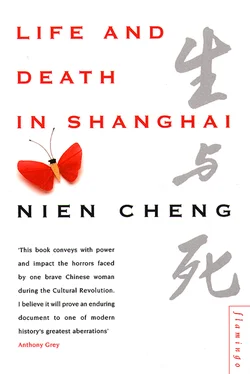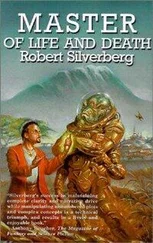After a week indoors, I asked the Red Guards how long I was supposed to remain without outdoor exercise, and requested that I be allowed to use the garden. After making a telephone call, they allowed me to go into the garden to walk round or to sit on the steps of the terrace with Fluffy on my lap. The ‘sin’ of biting a Revolutionary leader did not seem to be regarded as important by the young Red Guards. They would often play with Fluffy too.
Soon, Meiping realized that I was fairly often in the garden, especially in the early morning. Whenever she came home at night, she would throw notes there, rolled into a small ball for me to pick up when I went down for my daily exercise next morning. But when it rained during the night, as it often did in September, the paper got wet and disintegrated when I tried to unroll it. She could not say much on a tiny strip of paper, but her messages of ‘I love you, Mum,’ ‘Take care of yourself,’ ‘We will be brave and weather the storm together, dear Mummy’…etc. gave me great comfort and tempered my feeling of isolation.
If Lao Chao happened to be in the kitchen when I went for my meals, a Red Guard would follow me there to make sure we did not converse. But Lao Chao and the Red Guard would chat with one another. After a while I found that much of what Lao Chao said was information for my ears also. For instance, one day he said to a Red Guard, ‘Do you beat up your teachers often?’
I was astonished to hear Lao Chao’s question because when the Red Guards came to loot my house on the night of 30 August they seemed quite friendly with their teachers. I waited breathlessly for the answer.
The Red Guard said casually, ‘We beat them up when they are found to have capitalist ideas or when they insist we study and not have so many revolutionary activities. Some of them do not seem to understand the importance of carrying on with the Cultural Revolution. They still believe in the importance of learning from books. But our Great Leader Chairman Mao told us, ‘Learn to swim from swimming.’ We should learn from taking part in revolutionary activities and from active labour. We don’t need the old type of school any more. Those teachers who still believe in books obviously oppose our Great Leader so we must treat them as enemies.’
Another time, Lao Chao asked the Red Guard, ‘Did you go to surround the building of the Municipal Government?’
‘Of course! And this wasn’t the first time or the last time either. The entire Shanghai Municipal Government is rotten with revisionism.’
It was from Lao Chao’s conversations with the Red Guards and from their handbills and publications that I gained the impression that, daily, thousands of new Revolutionaries were flocking to join the Red Guards and workers’ organizations that had sprung up like ‘bamboo shoots after the spring rain’. Whether hoping for personal gain or merely fearful of being thought politically backward, people felt compelled to become a part of the Proletarian Cultural Revolution.
The ransacking of the homes of members of the capitalist class and the attack on the intellectuals inflated the ego and whetted the appetite of the Red Guards and the Revolutionaries for violence. They were impatient to go further. It seemed to me that the Maoist leaders used this psychological moment to direct their anger and channel their energy towards putting pressure on the Shanghai Party Secretariat and Municipal Government, both of which were accused of protecting the capitalist class and opposing Mao’s policies. It was alleged that for years Mao’s orders were deliberately ignored. But officials of the Shanghai Party Secretariat and Municipal Government were not novices to the political game. They were experienced Communists who had survived many political storms and purges. And they were not unfamiliar with Mao’s tactics. Since Mao used the masses, they decided to use the masses themselves. Speedily they organized their own Red Guards and Revolutionaries to take part in the Cultural Revolution. They vied with the Maoist Red Guards and Revolutionaries to gain control of the situation in Shanghai. To succeed, each group had to be more red, more revolutionary, more cruel and more left in their slogans and action. Thus, not only was it at times extremely difficult to identify on which side a certain group was until the bloody civil wars broke out but also the so-called capitalist class and the intellectuals were confronted by two contesting groups who competed with each other in dealing the heaviest blow to demonstrate their authenticity.
As the scale of violence escalated and the scope of the Cultural Revolution expanded to include an ever-increasing number of class enemies, a new slogan was coined to emphasize the undesirability of children of capitalist class families. It said, ‘A dragon is born of a dragon, a phoenix is born of a phoenix and a mouse is born with the ability to make a hole in the wall.’ In short, it meant that since the parents were class enemies, the children would naturally be class enemies too. While I thought it rather astonishing in a country pledged to materialistic Marxism that a slogan should be coined based entirely on the importance of genetics, I had no time or the heart to dwell on it. Soon after its publication, my daughter Meiping was taken from the rank of the ‘masses’ and placed in the ‘cowshed’ where all those in the Film Studio denounced as class enemies were concentrated. The ‘cowshed’ earned its name from the fact that Mao Tze-tung had delineated all class enemies as ‘cow’s demons and snake spirits’. In the ‘cowshed’ the victims spent their time writing confessions and self-criticisms over and over again in an effort to purge themselves of heretical thinking contrary to Mao Tze-tung Thought. I was informed of this situation through Lao Chao’s conversation with one of the Red Guards. In a loud voice, just outside my bedroom, he asked the Red Guard’s permission to take bedding and clothing to my daughter in the so-called ‘cowshed’ of the Film Studio because she could no longer come home. Later, when I went into the kitchen for my evening meal, which I could not swallow but pretended to eat, in order to find out about my daughter’s condition, Lao Chao did not disappoint me. As soon as I sat down, he talked about Meiping to the unsuspecting Red Guard.
‘I saw her when I went to the Film Studio to give her the things. She looked quite well and seemed cheerful. She told me she was writing self-criticism about herself and her class origin. She also said all those in the cowshed were very friendly. In fact, she seemed quite all right and is taking everything philosophically. But why should she have to write self-criticism? She is a member of the Communist Youth League and everywhere she went she got citations of merit. She is sympathetic and friendly towards the proletariat. Once she even saved the life of a poor peasant woman by rowing her in a boat through the creeks to the County Hospital when the woman was suddenly taken ill.’
‘She was born abroad and from a family like this. Of course she has to write self-criticism,’ the Red Guard said to Lao Chao. ‘She is probably a radish; red outside but white within. In any case, the Communist Youth League is disbanded. The General Secretary of the Youth League, Hu Yao-bong, is a revisionist.’
Shortly afterwards, a group of Revolutionaries from the Film Studio came to ransack her room and took away what was left of her things. I was desperately unhappy with the new turn of events. I could keep my spirit buoyant when the attack was directed at me alone, but now that she had also become the object of persecution I suffered from deep depression.
In the late afternoon of 27 September, I was taken by a Red Guard and a Revolutionary to the same school building I had gone to in July. A large gathering was already there waiting for us. This time I was the object of the struggle meeting, attended not only by the Red Guards and the Revolutionaries who had come to my house but also by the former staff of Shell and the men in charge of their indoctrination who had questioned me. The man with the tinted spectacles was in charge.
Читать дальше












